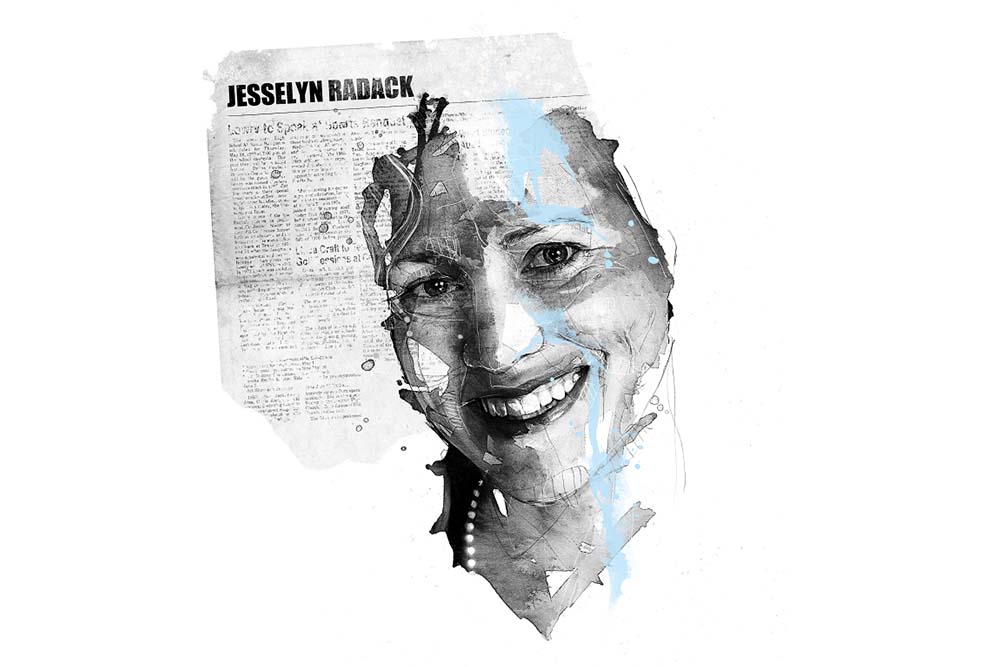You may not know Jesselyn Radack. But you definitely know her clients.
About her decision to blow the whistle on the Department of Justice, Jesselyn Radack told The Verge: I couldn't live with the idea that someone might be killed because I didn't speak up.
Her name may not be familiar, but her clients’ names are. Lawyer Jesselyn Radack defends whistleblower Edward Snowden (who was referred to her by Julian Assange), and was counsel for another NSA whistleblower, Thomas Drake, drone programme whistleblower Brandon Bryant, and John Kiriakou, former CIA analyst who was the first government official to confirm the U.S. government’s use of waterboarding on Al Qaeda prisoners. An impressive client list, to be sure, but how did she end up defending all these whistleblowers? Radack is one too.
In 2001, shortly after the September 11th attacks in the U.S., Radack was working as an ethics advisor in the Department of Justice’s Professional Responsibility Advisory Office and was contacted by a FBI counterterrorism prosecutor who wanted to know if it would be ethical to interrogate John Walker Lindh, an American citizen accused of fighting with the Taliban in Afghanistan, without his lawyer present. Lindh’s family had hired a lawyer for him in the U.S., but they had no access to Lindh, who was being held on a military base in Afghanistan. In a series of over a dozen emails, Radack told the prosecutor that he could be questioned, but the results of any questioning could not be used in a criminal case against Lindh. The FBI went ahead with the interrogation, later claiming that Lindh had no lawyer, and used statements from the interrogation against him in court.
During Lindh’s trial, the Department of Justice was ordered to produce records of the ethics advice that Radack had provided to the FBI prosecutor. It turned out that these had conveniently disappeared from the case file. Radack suspected that her department was not telling the whole story about the advice she had given to the FBI. She decided to act. She recovered the missing emails, gave them to her boss, and resigned. Later, when she heard that the Department of Justice claimed it had never said that Lindh was entitled to a lawyer during interrogation, she suspected that her emails had not been included in the court record. She sent them to a Newsweek reporter who had been reporting on the case, who later wrote an article about them.
As a result of her actions, Radack was placed under criminal investigation, referred for discipline to various state bar associations and placed on the no-fly list. In an article she wrote in 2010 for the Los Angeles Times, Radack described how, after she found work at a private firm, the Department of Justice’s Office of the Inspector General told her new employer that she was under criminal investigation and pressured them to fire her. Department of Justice officials also smeared her in the media, calling her a traitor.
In an article published in The Verge, Radack explained how on a trip to Moscow to meet with Snowden and give him the Sam Adams award, a prize created by former CIA officials “to reward intelligence officials who demonstrated a commitment to truth and integrity, no matter the consequences”, she ran into Russian surveillance at her hotel. Even at home, she once spotted a suspicious black van on the street outside her house.
Since her ordeal with the Department of Justice, Radack has represented the Thinthread group – four pre-Snowden NSA leakers, including Thomas Drake. She also worked as Director of the National Security & Human Rights Program at the Government Accountability Project, a whistleblower protection and advocacy organization that was founded in 1977. She now works at ExposeFacts as their National Security and Human Rights Director and recently launched the new Whistleblower and Source Protection Program (WHISPeR). According to Radack, the new programme will “provide journalists, sources, whistleblowers, and hacktivists with critical affordable legal protection, public advocacy, and the latest in encryption technology.”
Radack has received the Sam Adams Associates for Integrity in Intelligence Award in 2009, the Hugh M. Hefner First Amendment Award in 2012, and was named one of Foreign Policy magazine’s Leading Global Thinkers of 2013. She served as a Woodrow Wilson Visiting Fellow for 2014-2016. She has also testified before the U.S. Congress, the European Parliament, the Council of Europe, and Germany’s Bundestag on issues related to whistleblowing. Some of her most prominent opinions have been published by the New York Times, the Wall Street Journal, the Los Angeles Times and the Washington Post, among other major outlets.
Radack continues to represent Daniel Hale and others mentioned under the Espionage Act.
Her experience is chronicled in her memoir, TRAITOR: The Whistleblower and the “American Taliban” and in the documentary Silenced.
Illustration by Florian Nicolle

